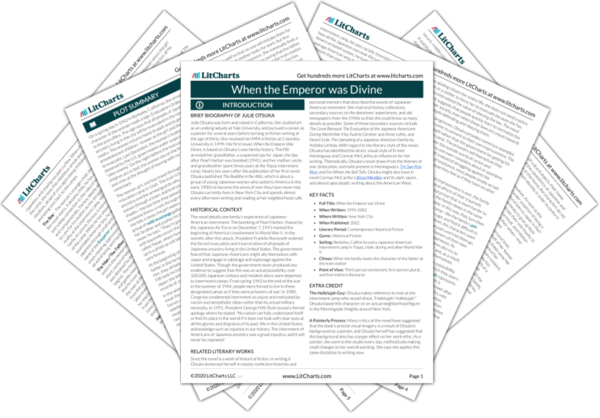The term “model minority” refers to minority groups that have supposedly achieved high levels of socioeconomic success in America. The term initially was used to describe Japanese-Americans, but has since extended to include people from Jewish, East Asian, and South Asian communities as well.
In this novel, Otsuka suggests that the experience of internment acted as a sort of cultural trauma in the minds of Japanese-Americans, causing them to react by seeking conventional forms of success in the United States. For example, as a result of their traumatic experiences in the camp, the boy and girl decide to be obedient and work extra hard so that they will never be mistaken for “the enemy” again. The children hope that by conforming to conventional American definitions of success, they will appear as upstanding citizens and thus be safer from future discrimination.
This fear of returning to the camp essentially forces the children to construct a new, psychological kind of prison for themselves. To be part of the model minority, the children have to repress emotions like anger and frustration—anything that might be seen as negative and used as an excuse for discrimination. They even have to accept the racism and intolerance of their white American peers without complaint, so as not to appear that they want to change the racial status-quo. To conform to the ideal of the model minority, the children have to restrict their behaviors, feelings, and desires. In the end, however, they have simply moved from a physical prison to a prison of the mind.
The Model Minority ThemeTracker

The Model Minority Quotes in When the Emperor was Divine
She’d been in America for almost twenty years now. But she did not want to cause any trouble—“The nail that sticks up gets hammered down”—or be labeled disloyal. She did not want to be sent back to Japan. “There’s no future for us there. We’re here. Your father’s here. The most important thing is that we stay together.”…
Loyalty. Disloyalty. Allegiance. Obedience.
“Words,” she said, “it’s all just words.”
Nothing’s changed, we said to ourselves. The war had been an interruption, nothing more. We would pick up our lives where we had left off and go on. We would go back to school again. We would study hard, every day, to make up for lost time. We would seek out old classmates…We would listen to their music. We would dress just like they did. We would change our names to sound more like theirs. And if our mother called out to us on the street by our real names we would turn away and pretend not to know her. We would never be mistaken for the enemy again!
I spied on you—you get up at six, you like bacon and eggs, you love baseball, you take your coffee with cream, your favorite color is blue.
















